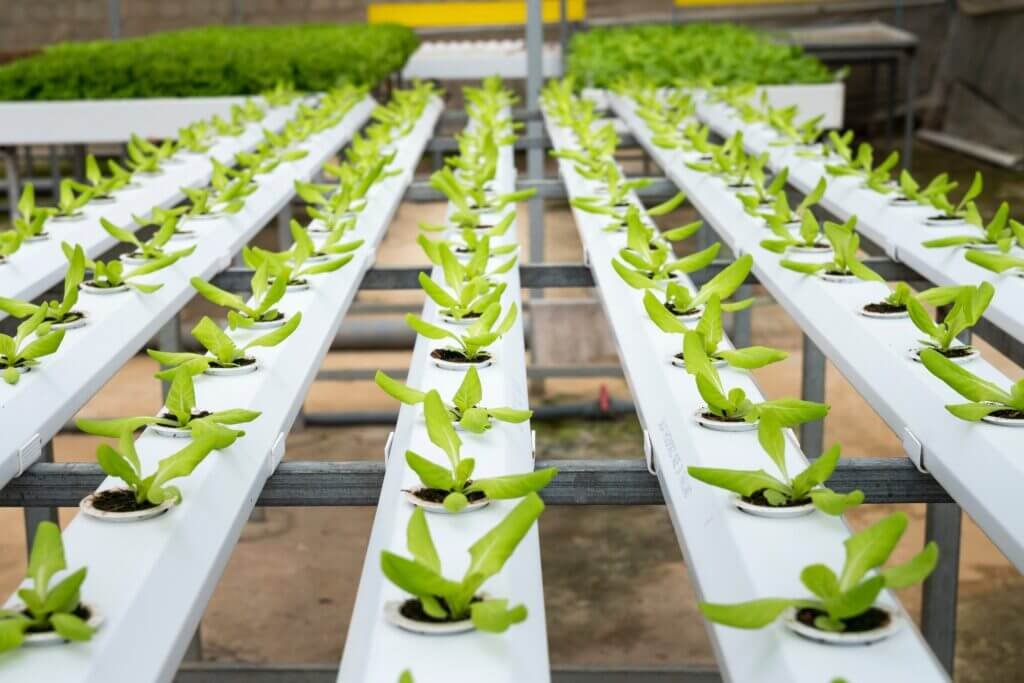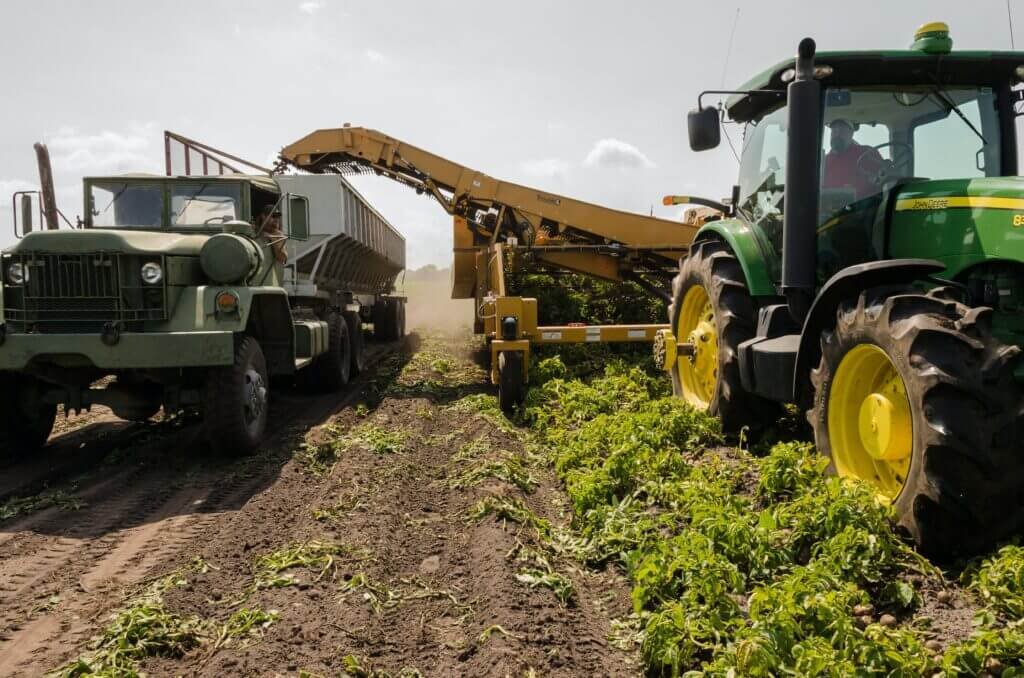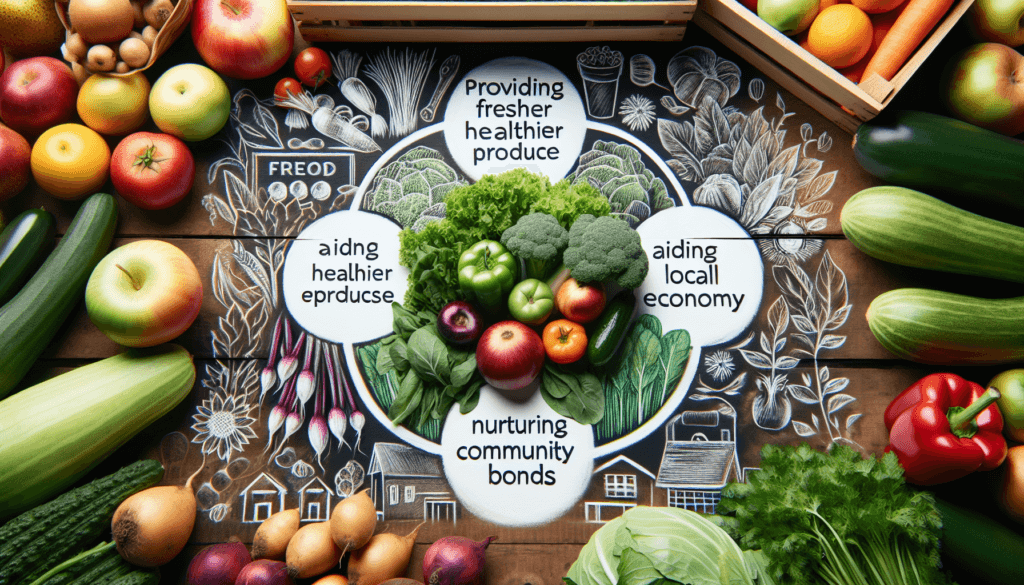Imagine living in a community where lush green fields stretch for miles, and the sweet scent of freshly harvested crops fills the air. Farms nestled in your local community not only add charm and picturesque beauty, but they also bring a plethora of benefits that are often overlooked. From promoting sustainable living to providing access to fresh and healthy produce, farms play a crucial role in ensuring the well-being of our neighborhoods. In this article, we will explore three key advantages of having farms in your local community that go far beyond just the beauty they bring to the landscape. So, get ready to discover how these farms can enhance your life and foster a stronger sense of community connection.

Economic Benefits
Job Creation
Having farms in your local community can lead to job creation. Farms require a range of tasks to be carried out, from planting and harvesting crops to tending to livestock and maintaining equipment. These activities create employment opportunities for individuals in the community. By supporting local farms, you contribute to the growth of the agricultural sector and help create a sustainable source of income for farmers and their employees.
Supporting Local Businesses
Farms in your local community not only benefit the farmers themselves but also support other local businesses. When farms thrive, they require various goods and services, such as equipment, seeds, fertilizers, and packaging materials. By sourcing these supplies locally, farms contribute to the economic vitality of the community. In turn, local businesses have more customers, leading to increased economic growth and prosperity.
Tax Revenue Generation
Farms play a significant role in generating tax revenue for the local government. As farms operate and generate income, they contribute to the overall tax base. This revenue can be used to support essential public services, infrastructure development, and community programs. By having farms in your local community, you contribute to the financial stability of the region and help ensure the availability of government-funded services and initiatives.
Environmental Benefits
Preservation of Natural Resources
Farms in your local community can contribute to the preservation of natural resources. Sustainable farming practices, such as crop rotation, organic farming, and water conservation techniques, help reduce the negative impact on the environment. By prioritizing soil health and minimizing the use of harmful pesticides and fertilizers, farms support the long-term sustainability of the land and preserve vital natural resources for future generations.
Reduced Carbon Footprint
The presence of farms in your local community can help reduce the carbon footprint. Farms that focus on local production and distribution minimize the need for long-distance transportation of food, resulting in decreased greenhouse gas emissions. Additionally, sustainable farming practices can sequester carbon dioxide from the atmosphere and contribute to mitigating climate change. By supporting local farms, you actively contribute to reducing carbon emissions and promoting a more sustainable future.
Wildlife Conservation
Local farms can provide essential habitats for wildlife, contributing to biodiversity conservation. Farms with diverse ecosystems, including hedgerows, ponds, and native plantings, create valuable habitats for birds, insects, and other wildlife species. These environments support pollinators, natural pest control, and overall ecological balance. Having farms in your local community helps create spaces where wildlife can thrive and contribute to the preservation of biodiversity.
Health Benefits
Access to Fresh and Nutritious Food
Having farms in your local community means easier access to fresh and nutritious food. Local produce is often harvested at peak ripeness, maximizing its nutritional content and flavor. By purchasing food directly from local farms or farmers’ markets, you can enjoy a wide variety of fruits, vegetables, and other farm products that are free from preservatives and lengthy transportation processes. Access to freshly harvested food enhances the overall nutritional quality of your diet, promoting better health and well-being.
Promotes Physical Activity and Well-being
Engaging with farms in your local community promotes physical activity and overall well-being. Visiting farms, participating in community-supported agriculture programs, or volunteering on local farms allows you to connect with nature and engage in various physical activities. Activities such as picking fruits, tending to crops, or working with animals require movement and provide opportunities for exercise. Regular physical activity supports cardiovascular health, strength, and mental well-being.
Community Engagement and Social Interaction
Farms in your local community foster community engagement and social interaction. Farmers’ markets, farm tours, and agricultural festivals provide spaces for people to gather, connect, and engage with local farmers and producers. These events promote a sense of community and encourage social interaction, allowing individuals to learn directly from those who grow their food. Farming activities also provide opportunities for community volunteering, further strengthening the bonds within the community.
Educational Benefits
Hands-on Learning Opportunities
Farms in your local community offer valuable hands-on learning opportunities, particularly for children and students. Through farm visits or farm-based educational programs, individuals can learn about various aspects of food production, sustainable farming practices, and environmental stewardship. Engaging with farms allows for a deeper understanding of the agricultural process and instills appreciation for the hard work and dedication of farmers.
Promoting Environmental Awareness
By having farms in your local community, you promote environmental awareness and education. Farms often serve as living classrooms, showcasing sustainable land management practices and the importance of biodiversity. Individuals who interact with farms gain a greater understanding of the connections between their daily food choices and the environment. This awareness can inspire individuals to make more environmentally conscious decisions and support sustainable agricultural practices.
Sustainable Farming Practices
Farms in your local community can serve as role models for sustainable farming practices. Many local farmers prioritize organic farming methods, utilize renewable energy sources, and focus on soil health and conservation. By observing these practices firsthand, individuals can learn about the importance of sustainable farming and its positive impact on the environment. Promoting sustainable farming practices helps create a more resilient and environmentally friendly agricultural system.

5. Food Security
Local Food Production and Availability
Having farms in your local community enhances food security by increasing local food production and availability. Relying on local farms for a portion of your food needs reduces dependence on distant sources and minimizes the risks associated with supply chain disruptions. By supporting local farms, you contribute to building a more resilient food system that can sustain the community even in times of crisis.
Reduces Reliance on Imported Food
The presence of farms in your local community reduces reliance on imported food. Producing food locally means fewer resources and energy are used in transportation, as well as a lower carbon footprint. Importing food often involves long distances and may result in lower food quality due to delays in transportation. By prioritizing locally produced food, communities can increase self-sufficiency and reduce their dependence on external sources for sustenance.
Resilience in Times of Crisis
Farms in your local community provide an essential source of resilience in times of crisis. During emergencies, such as natural disasters or global pandemics, local farms can continue to produce and supply fresh food to the community. This resilience ensures that essential supplies are available even when external sources face disruptions. By supporting local farms, you contribute to the community’s ability to withstand and recover from crises.
6. Agricultural Diversity
Preservation of Traditional and Indigenous Crops
Farms in your local community play a crucial role in preserving traditional and indigenous crops. Many local farmers grow heirloom varieties and unique crops that have cultural and historical significance. These crops may have specific adaptations to the local climate and contribute to overall agricultural diversity. By supporting local farms, you help preserve traditional farming practices and ensure the continued cultivation of these important crops.
Supports Small-Scale Farmers
Having farms in your local community supports small-scale farmers who often face challenges in competing with larger industrial operations. Local farms are typically family-owned or run by small cooperatives, allowing for personalized attention to crops and animals. Supporting small-scale farmers helps maintain a vibrant agricultural sector and allows for more diverse farming methods and products. By choosing local, you contribute to the livelihoods of dedicated farmers in your community.
Food Culture and Culinary Traditions
Farms in your local community contribute to the preservation of food culture and culinary traditions. Local farmers often grow crops or raise livestock that have traditionally been a part of the community’s diet. By purchasing and consuming local food, you help sustain and celebrate these culinary traditions. Additionally, local farms may produce specialty products or unique varieties that enhance the culinary experiences of the community, adding to the richness and diversity of local cuisine.

7. Urbanization and Green Spaces
Counteracts Urban Sprawl
Farms in your local community help counteract urban sprawl and promote more sustainable land use. As cities expand, farmland is often converted into residential or commercial areas, leading to the loss of agricultural land and open spaces. By preserving farmland and promoting agricultural activities within the community, farms act as a buffer against excessive urbanization. The presence of green spaces and farms enhances the balance between urban development and the preservation of natural environments.
Enhances Aesthetics and Livability
The presence of farms in your local community enhances aesthetics and livability. Wide, open fields, vibrant crops, and farm animals contribute to the visual appeal of the surroundings. Farms often provide a contrast to urban spaces, offering a sense of tranquility and natural beauty. The availability of green spaces and the sight of agricultural activities can improve the overall livability and quality of life for residents in the community.
Promotes Biodiversity
Farms in your local community promote biodiversity by creating habitats for various plant and animal species. Many farms integrate eco-friendly practices to enhance biodiversity, such as planting native species, preserving hedgerows, and providing nesting sites for birds. These efforts contribute to the overall health and resilience of ecosystems. By supporting farms and their biodiversity initiatives, you actively contribute to the preservation of local flora and fauna.
8. Farmers’ Markets and Farm-to-Table Movement
Direct Connection Between Producers and Consumers
Farmers’ markets and the farm-to-table movement facilitate a direct connection between producers and consumers. By purchasing food from local farmers at farmers’ markets, you have the opportunity to interact with the people responsible for growing your food. This direct connection allows for transparency in the production process and fosters trust between farmers and consumers. You can ask questions, learn about farming practices, and gain a deeper appreciation for the food you consume.
Support for Local and Sustainable Agriculture
Farmers’ markets and the farm-to-table movement provide crucial support for local and sustainable agriculture. These platforms often prioritize the sale of locally sourced, seasonal produce and food products. By purchasing from farmers’ markets, you actively support local farmers who utilize sustainable farming practices, reducing the environmental impact of food production. Additionally, the farm-to-table movement encourages the consumption of fresh, unprocessed food, promoting a healthier and more sustainable diet.
Fosters Sense of Community
Farmers’ markets and the farm-to-table movement foster a sense of community and connection. These gatherings provide opportunities for people to come together, share food, and engage in conversations with local farmers and vendors. The communal atmosphere nurtures a strong sense of belonging and encourages community support. Farmers’ markets often serve as meeting places for neighbors, friends, and families, enhancing social connections and creating a vibrant and cohesive community.

9. Economic Stability and Resilience
Diversification of Local Economy
Having farms in your local community contributes to economic stability and resilience. A diverse local economy is less susceptible to sharp fluctuations caused by external factors. Farms provide an additional income source within the community, reducing reliance on a single industry or sector. By supporting local farms, you foster economic diversification and help create a more stable and resilient local economy.
Less Vulnerability to Supply Chain Disruptions
Local farms offer a more secure and reliable source of food, reducing vulnerability to supply chain disruptions. When food is produced and consumed locally, there is less reliance on long-distance transportation and global supply networks. Local farms are better equipped to adapt and respond to unforeseen events, such as natural disasters or transportation disruptions. By supporting local farms, you contribute to a more resilient and robust food system within your community.
Food Price Stability
The presence of farms in your local community helps stabilize food prices. By reducing dependence on external sources and minimizing transportation costs, locally produced food has a higher chance of maintaining stable prices. This stability benefits both consumers and farmers, providing them with a more predictable market. Supporting local farms contributes to price stability and helps ensure that affordable and nutritious food remains accessible to all members of the community.
10. Sustainable Land Use Practices
Preservation of Farmland and Open Spaces
Farms in your local community contribute to the preservation of farmland and open spaces. Rapid urbanization and development often lead to the conversion of agricultural land into non-agricultural uses. By supporting local farms, you help maintain the viability of farmland and protect open spaces from being engulfed by urban sprawl. Preserving farmland is vital for preserving the agricultural landscape, conserving natural resources, and ensuring future food production.
Water Conservation and Soil Health
Local farms often prioritize water conservation and soil health. Sustainable farming practices, such as efficient irrigation systems, proper soil management, and responsible use of fertilizers, contribute to water conservation and soil health. These practices help maintain soil fertility, prevent erosion, and minimize water pollution. By supporting local farms, you contribute to the adoption of sustainable land use practices that protect water resources and preserve the long-term productivity of the soil.
Reduces Dependency on Chemical Inputs
Having farms in your local community reduces dependency on chemical inputs in agriculture. Many local farms embrace organic farming practices, relying on natural methods to manage pests and promote soil fertility. By minimizing the use of synthetic pesticides and fertilizers, farms reduce the potential negative impacts on human health and the environment. Supporting local farms encourages the adoption of sustainable and chemical-free farming practices, contributing to a healthier ecosystem and safer food production.
Having farms in your local community offers a multitude of benefits that span across various aspects of life. From the economic advantages of job creation and tax revenue generation to the environmental benefits of resource preservation and wildlife conservation, farms play a vital role in creating sustainable and thriving communities. Moreover, farms provide health benefits through access to fresh and nutritious food, opportunities for physical activity, and community engagement. They also foster educational benefits by offering hands-on learning experiences and promoting environmental awareness. Farms contribute to food security by ensuring local production and reducing reliance on imported food, while also preserving agricultural diversity and supporting small-scale farmers. Furthermore, farms counteract urban sprawl, enhance aesthetics and livability, and promote biodiversity. Their connection to farmers’ markets and the farm-to-table movement fosters direct relationships between producers and consumers, supporting local and sustainable agriculture while creating a sense of community. The presence of farms also brings economic stability and resilience by diversifying the local economy, reducing vulnerability to supply chain disruptions, and maintaining food price stability. Finally, farms promote sustainable land use practices, preserving farmland and open spaces, conserving water and soil health, and reducing dependency on chemical inputs. Embracing farms in your local community is not only beneficial for individuals but also leads to the overall well-being and sustainability of the entire community.



